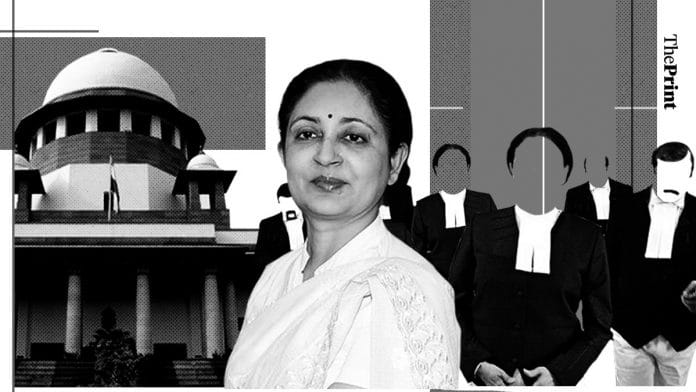The Supreme Court has said disclosing the collegium’s reason behind transferring judges ‘will not be in the interest of the institution’, but it would ‘if found necessary’. The recent transfer of Madras High Court Chief Justice V.K. Tahilramani has triggered criticism over the lack of transparency in the functioning of the collegium system.
ThePrint asks: Is SC justified in not giving reason for judge’s transfer citing institutional interest?
SC judges and Madras HC lawyers say Justice Tahilramani hardly worked and only adjourned cases

Markandey Katju
Former Judge, Supreme Court of India
The Supreme Court is justified in not disclosing the reason for a judge’s transfer because doing so impacts its institutional interest. It could also cause humiliation for the judge being transferred and create a stigma against him.
Regarding Chief Justice Tahilramani’s transfer from the Madras High Court to the Meghalaya High Court, I made a lot of enquiries from the sitting Supreme Court judges and Madras High Court lawyers. They all told me that she was hardly working. She would rise usually at 12 or 12.30 pm, and would rarely sit after lunch. She did this for a year. She passed only interim orders, adjourned cases and rarely gave final judgments. Even other judges were emulating her.
One must realise the Madras High Court is of great repute and it is the duty of its Chief Justice to lead the way judicially and not just administratively.
There are many transfer orders I disagree with, but I believe the collegium made the right decision in this case. The Supreme Court is only protecting its institutional interest. If there is a scenario of a judge being transferred for indulging in corruption or indolence, disclosing this information would hamper the stature of the court. It is common practice that the reasons for the transfer are never stated. All that is stated is that the transfer is on administrative grounds. I believe this is good practice.
Also read: Justice Tahilramani’s resignation shows why Supreme Court collegium is a failed system
Transferring judge without giving reason not justified. SC must realise we live in age of accountability
 Arghya Sengupta
Arghya Sengupta
Founder and Director, Vidhi Centre for Legal Policy
It is my view that the Supreme Court is not justified in withholding reasons for Justice Tahilramani’s transfer citing institutional interest. The 1993 judgment in Supreme Court Advocates On Record Association vs Union of India states that the transfer of judges by the collegium cannot be “punitive” and must be in “public interest”.
So, if the Supreme Court collegium is using this logic to exercise something in public interest, then the public should have a right to know why it decided to transfer Justice Tahilramani to the Meghalaya High Court. The norm must be that.
There could be two instances where giving reasons for transfer of judges would not be in institutional interest. First, the reason for the transfer is extremely private (such as health issues) and disclosing it would breach a judge’s privacy. Considering the recent transfers, and in this case, this exception is unlikely to be applied.
The second reason could be that the judge is not performing well and is unable to carry out his or her responsibilities. However, these reasons especially need to be disclosed. The Supreme Court has an anachronistic notion that these factors must be hidden from public view — and if disclosed will reduce its stature. The top court must realise that we live in an age of accountability, and unlike the past, the Supreme Court today is a powerful institution of governance. Disclosure of reasons will only add to its’ stature and create a deterrent for errant judges in the future.
Also read: SC collegium rejects Madras HC chief justice’s request to reconsider transfer to Meghalaya
Disclosing the reason behind transfer will expose the judge to greater risks
 BS Chauhan
BS Chauhan
Former Chairman, Law Commission of India & former judge of Supreme Court
The Supreme Court’s decision to not disclose the reason behind the judges’ transfer is completely justified. The court is merely protecting its institutional interest. In 1981, in the SP Gupta vs Union of India case, the Supreme Court had at length debated the central government’s argument to not disclose the communication with the CJI over the appointment and transfer of judges. The court had rejected the government’s claim for protection against disclosing the communication and ruled that secrecy could be allowed only if the matter goes against public interest.
Since that famous case, many judges have been transferred. The Supreme Court collegium has always decided where the judges’ services are required, whether they are required in smaller high courts or larger ones, and where they can serve better. A lot of these factors are considered when deciding the transfer of a judge.
Reasons for transferring judges have never been disclosed. The only disclosure made is by writing ‘administration of justice’ when a judge is being transferred.
One must realise that if a reason is disclosed, then the collegium is exposing the judges to greater risks. For example, if reasons like the judge’s lack of punctuality or inefficiency are revealed to the public, then the judge will face stigma throughout his or her life. It is in the interest of better administration of justice.
SC should understand disclosing reasons for its decisions will increase public confidence in judiciary
 Alok Prasanna Kumar
Alok Prasanna Kumar
Senior Resident Fellow, Vidhi Centre for Legal Policy
The short answer to the question posed is: no, the Supreme Court’s decision is not justified.
The long answer is that there is no possible institutional interest in keeping important information about transfers secret. Especially given how the manner of the transfer has raised questions about the independence of the collegium.
The judiciary is a public institution whose institutional standing only increases when it becomes more transparent. The more information the judiciary puts out in the public domain, the more confident people become about the administration of justice.
Unfortunately, the current collegium seems to believe that the judiciary and its functioning is its private fief, and scrutiny by the public, undesirable. Such an attitude in no way furthers any institutional interest, but only harms the institution much more.
While making the collegium’s resolutions public is a welcome move, the absence of vital facts and reasoning in the resolutions threatens to make the exercise futile. Whether or not the Supreme Court reveals information in Justice Tahilramani’s case, one hopes that going forward, the apex court sees the importance of maintaining public confidence in the judiciary by disclosing reasons for its decisions.
By Revathi Krishnan, journalist at ThePrint







What is the locus standy of Supreme Court about questioning arbitrary transfer of bueaurocrats by Central and State Governments, when they themselves do such things without any accountability. The credibility of Higher Judiciary is eroded.
When you enter service transfer is a routine. What the judge did is not correct. She is trying to take advantage of being a woman.transfer is not a promotion or demotion, why some lawyers are supporting her is a big mystery.
You lack basic understanding of the problem
Let us assume that Justice Katju is right, although one tends quite often to disagree with him. In that case, the honourable CJI could have requested CJ Tahilramani to meet with him, discuss the working of the Madras High Court and her difficulties in doing full justice to her assignment.
Whenever a favoured bureaucrat is given an extension – or four – it is invariably in the “ public interest “. When supersessions take place, it is the “ government’s prerogative “. To unlettered citizens, that sounds a little like Govinda’s song, Meri marzi. 2. All public servants are accountable, answerable, being progressively subjected to higher levels of transparency. That is why many regard the RTI Act as UPA’s finest hour. When a lady judge of impeccable integrity is shifted from helming a High Court with 75 judges to one with three, including herself, that is an exceptional event, which requires cogent reasoning and justification. When she resigns as a consequence, it is incumbent that the reasons be made public.